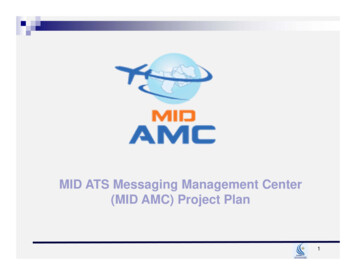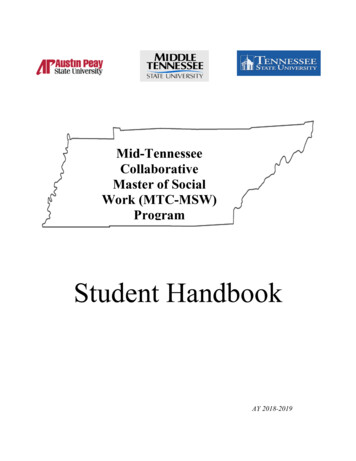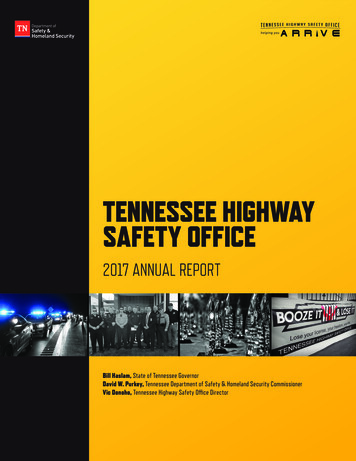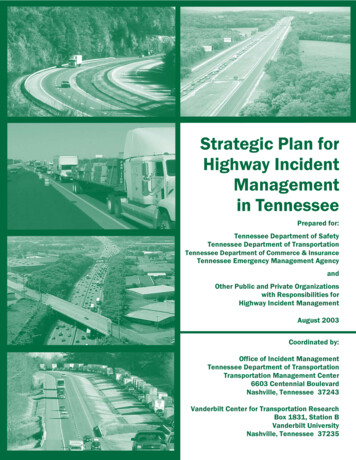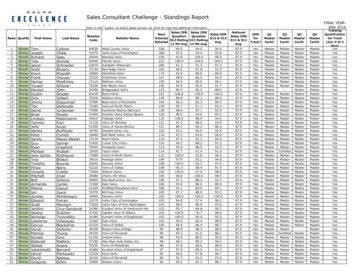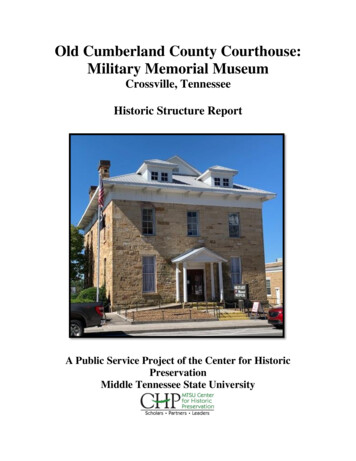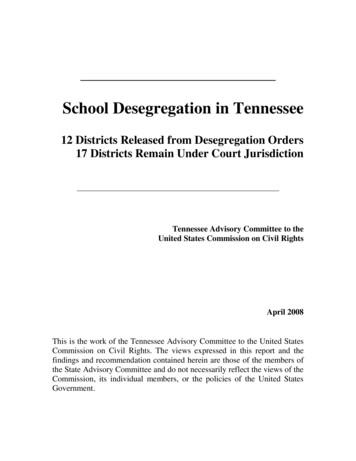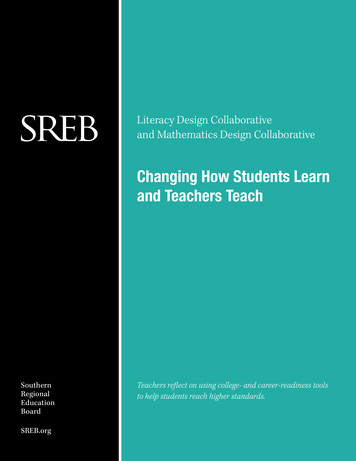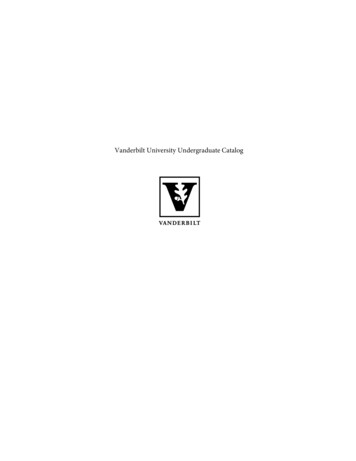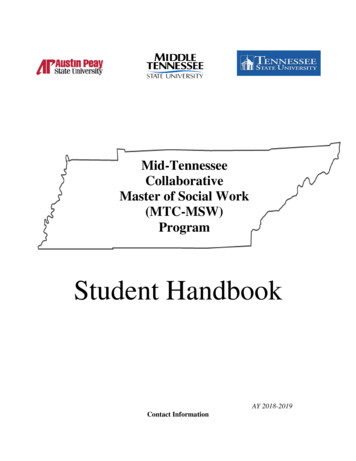
Transcription
Mid-TennesseeCollaborativeMaster of Social Work(MTC-MSW)ProgramStudent HandbookAY 2018-2019Contact Information
APSUDepartment of Social Work, Austin Peay State University, Clement Building, Room 103, P. O.Box 4656, Clarksville TN 37044; (Main Number) 931-221-7730; (FAX) 931-221-6440Tatsushi Hirono, PhD, Chair,Department of Social WorkBarbara Beswick, MSSW, MSW Field Coord.Michelle Blake, PhD, MSW FacultyStephanie Hicks, PhD, MSW Coordinator/FacultyShani Collins-Woods, PhD, SW FacultyJeff Thompson, D.Min, SW FacultyEricka Davis, Admin. Asst.TECH SUPPORT: Mike L. nt of Social Work, Middle Tennessee State University, P.O. Box 139 – 1301 E. MainSt. Murfreesboro, TN 37132; (Main Number) 615-898-2868; (FAX) 615-898-5428Cathy McElderry, PhD, Chair,Department of Social WorkJustin Bucchio, PhD, MSW Coordinator/FacultyKathleen Darby, PhD, SW FacultySasha Fallon, LAPSW, LCSW, MSW Field Coord.Vickie Harden, PhD, MSW FacultyJones, Nikki, PhD, SW FacultyJohn Sanborn, MSW, SW FacultyRebecca Smith, PhD, SW FacultyDian White, Admin. Asst.TECH SUPPORT: Jan 15-494-7957615-494-8705615-904-8189TSUSocial Work Program, Tennessee State University, P.O. Box 9525, 3500 John Merritt Blvd.,Nashville, TN 37209; (Main Number) 615-963-7641; (FAX) 615-963-7672Delores Butler, LAPSW, Interim Program Director dbutler@tnstate.eduDepartment of Social WorkKeith Ekhator, MSW, SW Facultykeith.ekhator@mnps.orgSara V. Evans, MSSW, LAPSW, SW Facultysara.evans@thistlefarms.orgKevin Haggard, PhD, SW Facultykhaggard@tnstate.eduJay Hedgpeth, PhD, MSW Facultyjhedgpet@tnstate.eduHannah Washington, MSW Field Coord.washingtonhannah2@gmail.comAli Winters, DSW, MSW Facultyawinter2@tnstate.eduBenisha Hill, Admin. Asst.bhill36@tnstate.eduTECH SUPPORT: Cheryl Seay, Ph.D.cseay1@tnstate.eduTHE MID-TENNESSEE COLLABORATIVEMASTER OF SOCIAL WORK (MTC-MSW) 67615-963-7360
Welcome to the Mid-Tennessee Collaborative Master of Social Work (MTC-MSW) Program.This unique collaboration brings together three institutions of higher education in Tennessee:Austin Peay State University, Middle Tennessee State University, and Tennessee StateUniversity. This is one program that has three locations. The program is designed for theworking professional, with some courses offered on-campus in the evening and others offeredonline. It can be completed on a full-time or a part-time basis.The MTC-MSW Program began in fall 2009 with the admission of students to the full 60-hourprogram. Admission of advanced standing students began in fall 2010. Students who have aBachelor of Social Work degree from an accredited undergraduate social work program and acumulative GPA of 3.00 are eligible for advanced standing.The MTC-MSW program prepares students for Advanced Generalist Social Work Practice. Weare frequently asked: What is Advanced Generalist Social Work? And, how does theconcentration of Advanced Generalist impact the jobs for which I will be eligible? Theadvanced generalist concentration provides a generalist specialty area for the student. A clinicalor direct practice concentration prepares students for clinical or direct service work withclients. An administrative concentration prepares students to provide indirect services. Theadvanced generalist concentration prepares students to work with both direct and indirectservices.Agency-based internships are a vital part of MSW students’ learning. The MTC-MSW Programis pleased to be able to offer a wide variety of agencies that can serve as field education sites.Students complete 900 hours during their two internship experiences. Employment-basedinternships are encouraged for those already working in a social work setting, as long as a newlearning experience can be provided.As this program has three locations, you must first determine your home campus. The homecampus is where you apply for admission, take your on-campus courses, enroll each semester,and pay tuition. Although you have a home campus, you also have classmates on the other twocampuses. When you are enrolled in online courses, you will be interacting with students fromall three locations.The Council on Social Work Education (CSWE) is the accrediting body for Social Work. TheMTC-MSW Program is fully accredited by CSWE. Graduates with a CSWE accredited degreeare eligible for licensure as a social workerAs a MSW student, you will be encouraged to pursue your own interests and goals as well asthose of the program in order to become an active and independent learner. Each member of theMTC-MSW faculty stands ready to assist you, and we look forward to establishing a team efforttowards your social work education and social work career.This handbook is intended to: acquaint prospective applicants with the MSW program
serve as a reference for studentssupplement the university catalogWe look forward to working with you and getting to know you.Faculty & StaffMTC-MSW Program
Table of ContentsMission Statement1MTC-MSW Program Goals1MTC-MSW Program Competencies1The MTC-MSW Program’s Advanced Generalist Model2Admission to the MTC-MSW Program3Financial Aid3Curriculum Design4Degree Plan – Program of Study7Advisement Policies and Procedures8Admission to Field8Admission to Candidacy9Comprehensive Examination9Graduation Requirements9Counseling Out10Students’ Rights and Responsibilities10Student Participation10Grade Appeal11Academic Integrity11Reasonable Accommodations for Students with Disabilities12Reporting of Unofficial Withdrawals12Non-Discrimination Policy12Policy on Harassment13Access to Educational Records13Exceptions to MTC-MSW Program Policies13Student and Professional Organizations14Awards/Scholarships15Social Work Advisory Board16Grievance Procedure16APPENDIX: MTC-MSW Program Policies
MISSION STATEMENTThe mission of the Mid-Tennessee Collaborative Master of Social Work (MTC-MSW) Programis dedicated to the enhancement of human well-being, diversity, and social justice throughdeveloping and improving systems of public social services, especially for children and families,by offering graduate training in Social Work with a hybrid model of delivery. The mission of theprogram reflects the dominant values of the social work profession and is dedicated to servingthe needs of the region, preparing social workers with an Advanced Generalist practiceorientation suited to the social context, and reflecting the values and skills of the profession.MTC-MSW PROGRAM GOALSThe goals of the MTC-MSW Program grow directly from its defined mission, the character ofthe region to be served, and the body of literature on the efficacy of the advanced generalistmodel for professional social work practice. To fulfill the above mission, the six goals of theMTC-MSW Program are:1. To prepare a diverse student population for advanced generalist social work practice basedon professional values and ethics to serve client systems of various sizes and types.2. To promote the development of social policies and services to reduce the impact ofpoverty, oppression and discrimination.3. To develop analytical skills and critical thinking that will encourage active participation inthe development, evaluation, and improvement of social work knowledge and skillsthrough research aimed at advancing social work practice.4. To promote the development of a multiple theoretical orientation applicable across systemsizes.5. To provide an understanding of diversity and cultural competence with an emphasis onsocial justice, empowerment, and improving the well-being of people.6. To socialize students to the profession of social work and the organizational environmentthrough evidenced based practice.MTC-MSW PROGRAM COMPETENCIESThe MTC-MSW Program’s mission and goals inform the design and organization of thecurriculum. Courses in the foundation and concentration curricula contribute to students’achievement of the following competencies, which, in turn, advances the MTC-MSW Program’sattainment of its goals.1. Demonstrate Ethical & Professional Behavior2. Engage Diversity and Difference in Practice3. Advance Human Rights and Social, Economic, and Environmental Justice4. Engage in Practice-informed Research and Research-informed Practice5. Engage in Policy Practice6. Engage with Individuals, Families, Groups, Organizations, and Communities7. Assess Individuals, Families, Groups, Organizations, and Communities1
8. Intervene with Individuals, Families, Groups, Organizations, and Communities9. Evaluate Practice with Individuals, Families, Groups, Organizations, and CommunitiesTHE MTC-MSW PROGRAM’S ADVANCED GENERALIST MODELThe MTC-MSW Program assumes two levels of professional preparation: foundation-levelgeneralist social work practice and advanced generalist social work practice. The advancedgeneralist level is distinguished by increased complexity and range of knowledge, depth ofanalysis, and expertise in skills reflected in preparation for advanced practice roles. Thisprogram prepares students for advanced generalist social work practice.Advanced generalist practice is practice that is autonomous, focused on public social servicesettings, and concerned with the enhancement of human well-being, diversity, and social justice,especially with children and families. Advanced generalist practitioners should be able toanalyze and resolve more complex ethical and value conflicts, apply empirically-basedinterventions to micro, mezzo, and macro practice situations, and use research methods toevaluate their own practice and to contribute to the profession’s knowledge base. Advancedgeneralist practitioners should be able to integrate knowledge, theories, and practice in such away as to eventually model and instruct others in the profession.The following figure illustrates our Advanced Generalist Practice Model ADVANCED GENERALISTincreased knowledge of theories & models for practice with iesincreased skills to address complex direct practice issues including individual/family/group techniquesincreased awareness of the needs, potentials, and influences of systems of public social servicesincreased ability to use, engage in, and analyze theoretical & practice research and evaluationabilities to conduct discipline and systematic eclectic practice via extrapolation, synthesis and refinement of generalistcompetenciesincreased skills to address complex indirect practice issues including supervision/administration/policy practice andprogram evaluationincreased capacity to build or link scarce resources in the environmentadded emphasis on client system strengths and empowermentFOUNDATION GENERALISTPERSPECTIVE-Ecosystems perspective-Openness in theory & methods-Indirect & direct intervention-Client centered perspective-Evidence based practice-Commitment to democracy,humanism, & empowermentCOMPETENCIES-Ethics & Professionalism-Diversity & Difference-Human Rights & SEEJ-Practice/Research Continuum-Policy Practice-Engage with IFGOC-Assess IFGOC-Intervene IFGOC-Evaluate IFGOCLIBERAL ARTSSelf-AwarenessValuing OthersCultural LiteracyAppreciation of ArtsCommunication SkillsUnderstanding social change & gov’t2
ADMISSION TO THE MTC-MSW PROGRAMIn addition to the standard institutional requirements for admission to the graduate college ateach of the participating universities, individuals must also submit an application to theDepartment of Social Work at their selected home campus. Information about the applicationprocess is available online at:APSU http://www.apsu.edu/SocialWork/graddegree.htmMTSU w.tnstate.edu/socialwork/msw/index.aspxThe Department of Social Work application for the MSW Program consists of: A completed MSW Application Form, which includes an essay.Three (3) reference forms to be completed by professionals who can address the applicant'sinterest in social work, potential for successfully completing a master’s program, andpotential for professional social work practice.Applicants interested in obtaining Advanced Standing must have: a) completed a Bachelor ofSocial Work degree from a CSWE-accredited program, and b) attained a minimum cumulativeGPA of 3.00 in their undergraduate course work. International students who hold abaccalaureate degree from a social work program outside the U.S. must have their transcriptreviewed by CSWE for a determination of equivalency.Applicants should be aware that, consistent with CSWE standards, the MTC-MSW Programdoes not grant academic credits for life, volunteer, or work experience.Applicants who have successfully completed graduate coursework at an accredited college oruniversity in a discipline other than social work may be able to transfer up to nine (9) credits ofelective coursework.Those who have successfully completed graduate coursework in social work at a programaccredited by CSWE should contact the Department of Social Work at their home campus forinformation on transferring credits.FINANCIAL AIDA number of loan programs are available to eligible students. Individuals also may qualify forthe federal work-study program. A limited number of assistantships and fellowships areavailable.General information about financial aid alternatives can be found online u/financial aid/For more information about financial aid, students are encouraged to contact the Financial AidOffice at their home campus.3
CURRICULUM DESIGNThe MTC-MSW Program’s curriculum prepares students to engage in advanced generalist socialwork practice. The curriculum is designed so that by the time students graduate they will haveacquired the knowledge, skills, and professional values to allow them to meet the needs of theregion and enhance human well-being, diversity, and social justice through developing andimproving systems of public social services, especially for children and families. Classroom andfield-based learning reinforce each other, allowing students to develop the competencies requiredof advanced generalist social work practitioners.The first 30 credits of the MTC-MSW Program’s curriculum constitute students’ foundationeducation experience. Foundation-level courses and field education equip students with theknowledge, skills, and professional values that form the core of generalist social work practice.The advanced generalist concentration curriculum, which entails 30 credits, builds on students’foundation learning and offers more advanced course work and field education experiences.Students admitted to the MTC-MSW Program with advanced standing are given credit for thefoundation curriculum’s course and field education requirements. Advanced standing studentscomplete the course and field education requirements of the 30-credit concentration curriculum.Students without advanced standing who enter the program with a strong background in contentcovered by certain foundation courses have the option of taking an examination to be exemptfrom those courses. Exemption from a foundation course is by examination only, and exemptionexams are only available for specific courses. Exemption from a foundation course does notreduce the number of credits a student must complete to satisfy the requirements for the MSWdegree; additional elective coursework can be taken to satisfy the 60 credits needed forgraduation.Registration for MSW courses is by permission of the department. The specific courses thatmake up the Foundation and Concentration curricula are described below.Foundation Courses (Foundation courses are restricted to students admitted to the MSWProgram)SW 6000 MSW Practice I (3 hours)A social work methods course designed to enable the student to understand and apply socialwork methods within the context of the generalist perspective with individuals and families.Prerequisite: Admission to MSW ProgramSW 6010 Human Behavior and the Social Environment (3 hours) (online delivery)An introduction to the theories and knowledge of the human bio-psycho-social developmentincluding theories and knowledge about the range of social systems in which individuals live(families, groups, organizations, agencies, and communities). Prerequisite: Admission to MSWProgram4
SW 6020 Research I (3 hours)This is a basic research and statistical methods course, utilizing research in general inquiry andpractice evaluation in social work with the generalist perspective. Prerequisite: Admission toMSW ProgramSW 6030 Social Welfare Policy and Services (3 hours) (online delivery)The historical development, philosophical orientation, and analysis of U.S. social welfare policyand services, including the global context. Prerequisite: Admission to MSW ProgramSW 6100 MSW Practice II (3 hours)A social work methods course designed to enable the student to understand and apply socialwork methods within the context of the generalist perspective with groups, agencies, andcommunities. Prerequisites: MSW Practice I & HBSESW 6110 Social Justice & Equity for Multicultural Populations (3 hours) (online delivery)An overview of the professional commitment of social work to oppressed peoples. Prerequisite:HBSESW 6120 Research II (3 hours)An advanced discussion of program evaluation strategies and single system design issues. Thestudent will conduct a research project. Prerequisite: Research ISW 6130 Practicum IA (3 hours)A 200 hour field practicum experience within the generalist perspective. May be takenconcurrently with Practicum IB. Prerequisites: MSW Practice I, HBSE, Research I, & PolicySW 6140 Practicum IB (3 hours)A 200 hour field practicum experience with the generalist perspective. May be takenconcurrently with Practicum IA. Prerequisites: MSW Practice I, HBSE, Research I, & Policy.Concentration Courses (Students must have taken their Foundation courses or been admitted withAdvanced Standing)SW 6200 Advanced Practice with Individuals (3 hours)Advanced practice with individuals including client system assessment, intervention, andevaluation. Prerequisites: Practicum IA (SW 6130) & IB (SW 6140) OR Advanced StandingadmissionSW 6210 Advanced Practice with Families (3 hours)Advanced practice with families including client system assessment, intervention, andevaluation. Prerequisites: Practicum IA (SW 6130) & IB (SW 6140) OR Advanced StandingadmissionSW 6220 Advanced Group Practice (3 hours)Advanced practice with groups including client system assessment, intervention, and evaluation.Prerequisites: Practicum IA (SW 6130) & IB (SW 6140) OR Advanced Standing admission5
SW 6230 Advanced Macro Practice (3 hours)Advanced practice with organizations and communities including system assessment,intervention, and evaluation. Prerequisites: Practicum IA (SW 6130) & IB (SW 6140) ORAdvanced Standing admissionSW 6240 Social Policy Analysis (3 hours) (online delivery)A study of the design, implementation, and analysis of social policies and their impact on socialwork practice. Prerequisites: Practicum IA (SW 6130) & IB (SW 6140) OR Advanced StandingadmissionSW 6300 Empirical Social Work Practice (4 hours)A seminar in the integration of theoretical perspectives and the application of research findingsand empirical outcome evaluation techniques to advanced generalist social work practice.Prerequisites: Advanced Practice with Individuals, Advanced Practice with Families ORAdvanced Group Practice, Advanced Macro Practice, & Social Policy AnalysisSW 6310 Practicum IIA (4 hours)A 250 hour field practicum experience. May be taken concurrently with Practicum IIB.Prerequisites: Advanced Practice with Individuals, Advanced Practice with Families ORAdvanced Group Practice, Advanced Macro Practice, & Social Policy AnalysisSW 6320 Practicum IIB (4 hours)A 250 hour field practicum experience. May be taken concurrently with Practicum IIA.Prerequisites: Advanced Practice with Individuals, Advanced Practice with Families ORAdvanced Group Practice, Advanced Macro Practice, & Social Policy AnalysisElective CoursesSW 5000 Special Topics (3 hours) (online delivery)Special topics in social work and social welfare. May be repeated for a maximum of 15 hours.SW 6400 Independent Study (3 hours)Independent study allows a student to develop more fully an area of his or her particular interest.Topics for intensive study are chosen in joint consultation between the student and the instructor.SW 6410 Aging Issues and Controversies (3 hours) (online delivery)This course examines the biological, psychological, and social issues affecting older adults. Thefield of gerontology is explored with special attention to current controversies in health care,independence, and social status with application of ethical theories to these problems. Specialattention is given to the impacts on the family of caregiving, alternative living arrangements,cognitive and physical decline, and other aging issues.SW 6420 Adult Mental Health (3 hours) (online delivery)This course prepares students for advanced generalist practice by integrating foundation levelknowledge of policy, research, HBSE and practice with substantive knowledge from the field ofmental health. Students will learn the basics of DSM-V diagnosis, biopsychosocial assessment,6
and treatment planning. They will be exposed to the skills necessary to conduct strengths andcompetency-based assessments and interventions. Permission of department required.DEGREE PLAN – PROGRAM OF STUDYFULL TIME PROGRAMMSW FOUNDATION, 30 SEMESTER HOURSFIRST YEAR:FallSW 6000SW 6010SW 6020SW 6030SW 5000HoursMSW Practice IHBSE (online)Research IPolicy (online)Special Topics (online)33333Total 15 hoursSpringHoursSW 6100 MSW Practice IISW 6110 Social Justice online)SW 6120 Research IISW 6130 Practicum IA (200 hrs)SW 6140 Practicum IB (200 hrs)33333Total 15 hoursSummerHoursOptionalSW 5000 Special Topics (online)OptionalSW 6140 Practicum IB (200 hrs)33Optional Total 6 hoursMSW CONCENTRATION IN ADVANCED GENERALIST PRACTICE, 30 SEMESTER HOURSSECOND YEAR:FallHoursSW 6200 Advanced Practice w IndividualsSW 6210 Advanced Practice w FamiliesORSW 6220 Advanced GroupsSW 6240 Social Policy Analysis (online)SW 6230 Advanced Macro PracticeSW 5000 Special Topics (online)33333Total 15 hoursSpringSW 6300SW 5000SW 6310SW 6320HoursEmpirical SW Practice4Special Topics (online) 3Practicum IIA (250 hrs) 4Practicum IIB (250 hrs) 4SummerHoursOptionalSW 5000 Special Topics (online)OptionalSW 6320 Practicum IIB (250 hrs)34Optional Total 7 hoursFOR SUMMER GRADUATESTotal 15 hoursPART-TIME PROGRAMMSW FOUNDATION, 30 SEMESTER HOURSFall - First YearSW 6000 MSW Practice ISW 6010 HBSE (online)Total 6 hoursFall - Second YearSW 6020 Research ISW 6030 Policy (online)Total 6 hoursHours33Hours33Spring - First YearHoursSW 6100 MSW Practice IISW 6110 Social Justice (online)Total 6 hoursSpring - Second Year33HoursSummer - First YearHoursSW 5000 Special Topics (online)Total 3 hoursSummer - Second YearHoursSW 6120 Research II3SW 6130 Practicum IA (200 hrs) 3SW 6140 Practicum IB (200 hrs)Total 6 hoursTotal 3 hours733
PART-TIME PROGRAM (cont.)MSW CONCENTRATION IN ADVANCED GENERALIST PRACTICE, 30 SEMESTER HOURSFall - First YearHoursSpring - First YearHoursSW 6200 Advanced Practice w Individuals 3SW 6240 Social Policy Analysis (online) 3SW 5000 Special Topics (online)SW 5000 Special Topics (online)Total 6 hoursTotal 6 hoursFall - Second YearHoursSW 6210 Advanced Practice w FamiliesORSW 6220 Advanced GroupsSW 6230 Advanced Macro PracticeTotal 6 hoursSpring - Second YearHoursSummer - Second YearHours33HoursSW 6300 Empirical SW Practice 4SW 6310 Practicum IIA (250 hrs) 433Summer - First YearSW 6320 Practicum IIB (250 hrs)Total 4 hoursTotal 8 hoursPart Time Students areSummer GraduatesADVISEMENT POLICIES AND PROCEDURESStudent advisement is an important component of the MTC-MSW Program. The purposes ofadvisement are to: Advise the student through the process of obtaining a MSW degree.Work with the student around any academic problems that may arise.Assist the student in exploring possible directions for his or her professional career.Once admitted, students are assigned to an academic advisor who is a faculty member. Facultyadvisors will have posted office hours during which they are available to meet with students foradvisement. They may also be contacted by phone or email.ADMISSION TO FIELDField education is one of the cornerstones of professional social work education. During theirfield practicum, MSW students have the opportunity to apply what they are learning in theclassroom to real world situations. They also can bring their field practicum experiences back tothe classroom for reflection, examination, analysis, and synthesis.Students who enter the MSW Program without advanced standing complete two fieldexperiences: a 6-credit foundation placement and an 8-credit advanced generalist practiceplacement. Students who enter with advanced standing complete a single, 8-credit advancedgeneralist practice placement. In addition to agency-based supervision, a faculty member servesas a liaison between the program and the placement to foster the integration of field andclassroom learning.Students should be aware that, consistent with CSWE standards, the MTC-MSW Program does84
not grant academic credits for life, volunteer, or work experience or for graduate-level internshipexperiences completed in a field or discipline other than social work.Orientation to the MTC-MSW Program’s field education component is provided to students eachfall semester. For further information on field education policies and procedures, including alisting of the specific criteria to be met before beginning a field placement, see the FieldEducation Manual.ADMISSION TO CANDIDACYAdmission to candidacy signifies that a student has demonstrated the ability to do graduate-levelstudies and is prepared to continue on with the work required for her or his degree. Criteria forAdmission to Candidacy include having: Been admitted to the MSW programSuccessfully completed a minimum of 12 hours of graduate workMaintained a cumulative GPA of 3.0Secured a faculty recommendation for candidacyFiled a degree plan/plan of study with appropriate approvalsCOMPREHENSIVE EXAMINATIONAs a non-thesis program, the culminating experience for the MSW Program will be a writtencomprehensive examination. The comprehensive examination will be completed in the student’sfinal semester of study, and will incorporate both the application of research and the integrationof classroom and field-based learning experiences. Information about the comprehensive examwill be provided in the SW 6300 Empirical Social Work Practice course.GRADUATION REQUIREMENTSTo qualify for graduation, MSW students must complete all of this program’s course and fieldeducation requirements and have a cumulative GPA of 3.00 or higher.It is the responsibility of the MSW student to submit in a timely fashion all necessary paperworkrequired for graduation by the home university’s College of Graduate Studies/School ofGraduate Studies and Research. Information on these requirements can be obtained from thehome university’s Graduate Catalog/Graduate Bulletin:APSU http://catalog.apsu.edu/index.phpMTSU /graduate/20132015 9
COUNSELING OUT"Counseling out" is a term used to describe discontinuing a student's enrollment in the MTCMSW Program. In most cases, the decision to discontinue a student in the program is consideredpermanent. In certain circumstances, a student may be counseled out with specific remedialsteps to be taken before formal re-application to the program may be made.Students can be counseled out for failure to meet academic standards, the conditions of academicprobation, or for behavior that violates university, practicum agency, or professional standards.Students have the right to appeal the counseling out decision through the identified grievanceprocedures of each of the three collaborating universities.STUDENTS' RIGHTS AND RESPONSIBILITIESThe MTC-MSW Program is committed to ensuring that MSW students are treated fairly andwith respect and dignity during their graduate education. Students deserve to have their workevaluated in a non-biased and timely fashion. They should receive appropriate recognition fortheir contributions to work they do with faculty members. No student in the MTC-MSWProgram should be subject to bias or discrimination on the basis of race, ethnicity, gender, age,religion, sexual orientation, or disability.A fuller statement of students’ rights and responsibilities can be found tudents%27-rights-andresponsibilities.pdfMTSU http://catalog.mtsu.edu/content.php?catoid 19&navoid urces.aspxSTUDENT PARTICIPATIONThe MTC-MSW Program fully supports students’ rights and responsibilities to formulate andmodify policies affecting academic and student affairs. MSW students are encouraged to be fullparticipants in exercising the rights and responsibilities available to them at the threecollaborating universities, as outlined in each university’s Graduate Catalog/Graduate Bulletin:APSU http://catalog.apsu.edu/index.phpMTSU /gr
Welcome to the Mid-Tennessee Collaborative Master of Social Work (MTC-MSW) Program. This unique collaboration brings together three institutions of higher education in Tennessee: Austin Peay State University, Middle Tennessee State University, and Tennessee State University. This is one program that has three locations.
